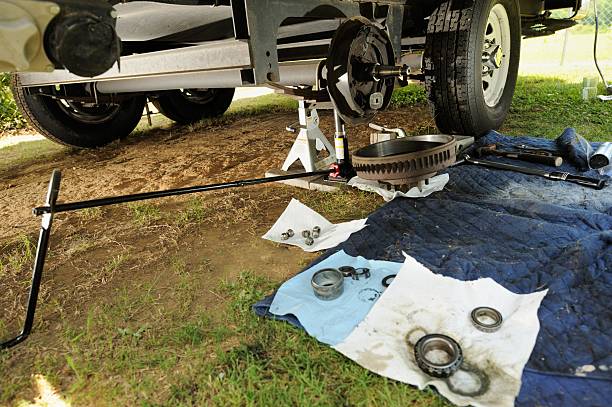A wheel bearing is an essential element of a vehicle’s wheel assembly, facilitating the smooth rotation of wheels with little resistance. Being a critical part of the car, it is essential to know when a wheel bearing needs replacement as it can affect vehicle safety and efficiency. This article explains how to recognize the signs of a bad wheel bearing to ensure timely maintenance and replacement for a smooth, safe ride.
Understanding Wheel Bearings
What is a Wheel Bearing?
A wheel bearing is a set of steel balls held together by a metal ring, known as a race. They are found in all vehicles, from cars to airplanes. The bearing sits snugly inside the hub, the hollow part of the wheel that attaches to the axle. Wheel bearings are critical for stabilizing the wheel and ensuring it rotates smoothly.
Why Wheel Bearings Are Important
Wheel bearings reduce friction between the wheel and the spindle, aiding in smooth tire and wheel rotations. This not only enhances the flexibility and velocity of the vehicle but also promotes its fuel efficiency. An efficiently operating wheel bearing assembly is crucial for ensuring the safety and optimal performance of the vehicle.
What are the Signs of a Bad Wheel Bearing
Unusual Noises
One of the first signs of a bad wheel bearing is an unusual noise coming from the wheel or tire area of the vehicle. This often sounds like grinding, grating, or growling, which typically gets louder as the vehicle accelerates. Any unusual noise should be checked out as soon as possible, as it indicates that the bearing is wearing out or that it has already worn out.
Wobbly Wheels
If you feel that your wheels are wobbly or if your steering feels looser than usual, it could be a sign that your wheel bearings are failing. A loose wheel bearing allows the wheel to move back and forth, which you might feel particularly when turning or making sharp maneuvers.
Uneven Tire Wear
When wheel bearings deteriorate, they can result in uneven tire wear. These are the key indicators of a faulty wheel bearing. This happens because the wheel is not able to rotate as freely as it should, causing the tire to wear down unevenly. Regular checks can reveal this issue, which people often misattribute solely to alignment problems.
ABS Failure
It is an important part of signs of a bad rear wheel bearing which is known as ABS failure. Manufacturers often install the Anti-lock Braking System (ABS) sensors close to the wheel bearings in modern vehicles. If a wheel bearing wears out, it can disrupt the sensor’s ability to track wheel speed accurately, which leads to the illumination of the ABS light on your dashboard.
Diagnosing a Bad Wheel Bearing
Visual Inspection
If you suspect that your wheel bearing is faulty. Start with a visual and physical check. Inspect the wheel end for indications of grease seepage. It is also one of the important signs of a bad wheel bearing. Also, check if the wheel is loose by jacking up the vehicle and trying to rock the wheel back and forth.
Listening to the Sounds
While the vehicle is still jacked up, you can rotate the wheel by hand. A functioning wheel bearing should allow the wheel to turn smoothly and quietly. Additionally, any resistance or grinding noise can indicate a problem.
Test Drive
A test drive can help confirm your suspicions. While driving, pay attention to any grinding noises or a progressively louder humming sound that correlates with the vehicle’s speed. Also, try swerving gently from side to side. If the noise decreases when turning in one direction, it could point to a bad bearing on the opposite wheel.
When to Replace a Wheel Bearing
Timing
Wheel bearings do not have a specific lifespan and their durability depends on factors like driving conditions and mileage. However, if you notice any of the symptoms mentioned above, it’s time to get your bearings checked by a professional. Delaying replacement can lead to further damage and more costly repairs.
Professional Inspection
Because replacing a wheel bearing requires specific tools and skills, experts recommend having a professional mechanic perform this service. This ensures that the mechanic completes the job correctly and safely, preventing further issues down the road.
Are Noisy Wheels Telling You It’s Time for a Check-Up?
Do you hear a grinding noise as you drive, or does your car feel unstable on the road? These indicators may suggest that your vehicle’s wheel bearings require maintenance. Our Wheel Bearing Services are customized to guarantee the safety and best performance of your RV. Don’t wait for the noise to get louder or for other complications to arise. Let our experts diagnose and solve your wheel-bearing issues with precision and care, using the latest tools and techniques.
Ready to ensure your ride is smooth and your wheels are in top shape?
Conclusion
Being aware of the signs of a bad wheel bearing and addressing them promptly is crucial for maintaining the safety and efficiency of your vehicle. Regular inspections and maintenance may identify defects in their early stages, preventing them from escalating into more serious problems or potential accidents. Always consult with a professional mechanic if you experience any of the symptoms discussed, and ensure that your vehicle remains in top condition for all your travels.

